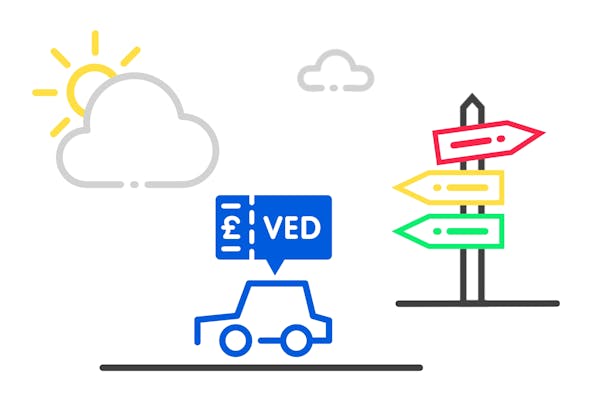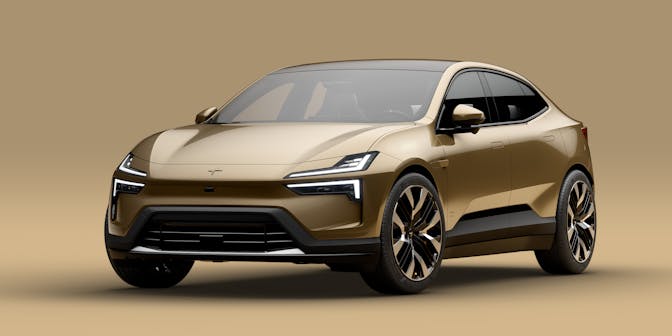Understanding Vehicle Excise Duty (VED) or "Road Tax" for EVs
Vehicle Excise Duty (VED), commonly referred to as road tax, is a tax levied on vehicles used on UK roads. Historically, electric vehicles (EVs) have been exempt from this charge. However, from April 2025, changes to VED rules meant that EV owners are now required to pay road tax. This guide explains everything you need to know:

What Is Vehicle Excise Duty (VED)?
VED is a tax you pay to drive a vehicle on UK roads.
The amount you'll pay depends on:
-
Your car’s CO₂ emissions (for electric cars and vans this is zero or 0g/km)
-
Its registration date
-
The vehicle’s list price
How much road tax do EV owners pay?
How much road tax you'll pay as an EV driver will depend on when your car was first registered and it's list price (also sometimes called a P11D) was when it was new:
- EVs registered on or after April 1, 2017, will pay the standard annual rate of VED, which is currently (April 2025) £195 per year.
- Older electric vehicles registered between 1st March 2001 and 30th March 2017 will be subject to the reduced rate for older vehicles of £20 per year.
- Newer EVs registered after 1st April 2025 will pay the standard annual rate, and if they cost over £40,000, an additional £425 “expensive car supplement” applies from years 2–6.
Are electric vehicles (EVs) exempt from road tax in the UK?
EVs are subject to road tax like petrol and diesel cars. Fully electric vehicles do pay some level of VED, the exact amount depends on when they were first registered.

Does my Personal Contract Hire (PCH) or Business Contract Hire (BCH) lease include road tax?
When you take out a lease, the cost of road tax is included at the rate applicable at that time. However, if the government increases VED during your lease term, your funder will issue a one-off invoice to cover the additional cost. This is usually a small adjustment, but since EVs have previously paid £0 VED, the increase will be more noticeable for PCH and BCH customers this year. VED is included in your lease price, eliminating a major initial expense. Even with potential government changes, the simplicity of one monthly payment makes budgeting easier.
When will I receive the VED invoice?
The VED rate for EVs is changing in April 2025, however your funder will re-charge the VED amount around the time your lease car reaches its registration anniversary. So you may not need to pay anything until as late as March 2026 depending on the date your car was registered.
Vehicle registration date |
Annual VED (from April 2025) |
|---|---|
Between 1 April 2017 - 31 March 2025 |
£195 (standard rate) |
Before 1st April 2017 |
£20 (reduced rate) |
On or after 1 April 2025 (Year 1) |
£20 |
On or after 1 April 2025 (Year 2+) |
£195 or £620* |
Do expensive electric cars over £40,000 pay more road tax?
New electric cars (registered on or after 1st April 2025) with a list price of £40,000 or more are subject to the expensive car supplement. This means an additional charge (£425 per year) will apply from the second to the sixth year of registration, bringing the total to £620 per year for that period.
List price |
Year 1 |
Year 2 |
Year 3 |
Year 4 |
Year 5 |
Year 6 |
Year 7 |
|---|---|---|---|---|---|---|---|
Less than £40,000 |
£20 |
£195** |
£195 |
£195 |
£195 |
£195 |
£195 |
£40,000 and over |
£20 |
£620*** |
£620 |
£620 |
£620 |
£620 |
£195 |

Are electric vans subject to road tax in 2025?
Yes, while electric vans have lost their VED exemption, they remain highly advantageous for commercial fleets. The savings on charging compared to traditional fuel are substantial, and the reduced servicing needs of models like the Vauxhall Vivaro Electric or the stylish Volkswagen ID. Buzz Cargo offer greater operational reliability. Crucially, by switching now, your business is future-proofing its fleet against tightening emissions regulations and avoiding the escalating running costs associated with non-compliant diesel vehicles.
Do plug-in hybrid vehicles have to pay full road tax?
Yes, plug-in hybrid vehicles (PHEVs) also saw an increase in VED from April 2025, they no longer benefit from reduced rates and pay the same standard rates as petrol and diesel cars.
Have EVs always had to pay road tax?
No, until April 2025 electric cars and vans were VED exempt
So why was road tax introduced for electric cars and vans? The UK government removed the electric powertrain exemption for road tax to ensure fairness across all vehicle types and to compensate for the reduction in fuel duty revenue as more and more drivers transition to EVs.
Our electric car lease offers
Cupra Born 170kW e-Boost V2 59kWh 5dr Auto
- £2,048.63 Initial rental (ex. VAT)
- £2,458.35 Initial rental (inc. VAT)
- 48 Month term
- 5000 Annual mileage
- Subject to status and conditions + arrangement fee

Genesis GV60 234kW Sport 77.4kWh 5dr AWD Auto [Comfort]
- £3,414.21 Initial rental (ex. VAT)
- £4,097.06 Initial rental (inc. VAT)
- 48 Month term
- 5000 Annual mileage
- Subject to status and conditions + arrangement fee

Polestar Polestar 4 200kW 100kWh LR Single Motor Prime 5dr Auto
- £3,611.97 Initial rental (ex. VAT)
- £4,334.37 Initial rental (inc. VAT)
- 48 Month term
- 5000 Annual mileage
- Subject to status and conditions + arrangement fee

Our expert guides
Electric vehicle winter driving tips and advice

Why 2025 is a turning point for SME fleets
6 surprising things you didn’t know about electric vans

Understanding Vehicle Excise Duty (VED) or "Road Tax" for EVs
Updated: May 2025
Published: February 2025